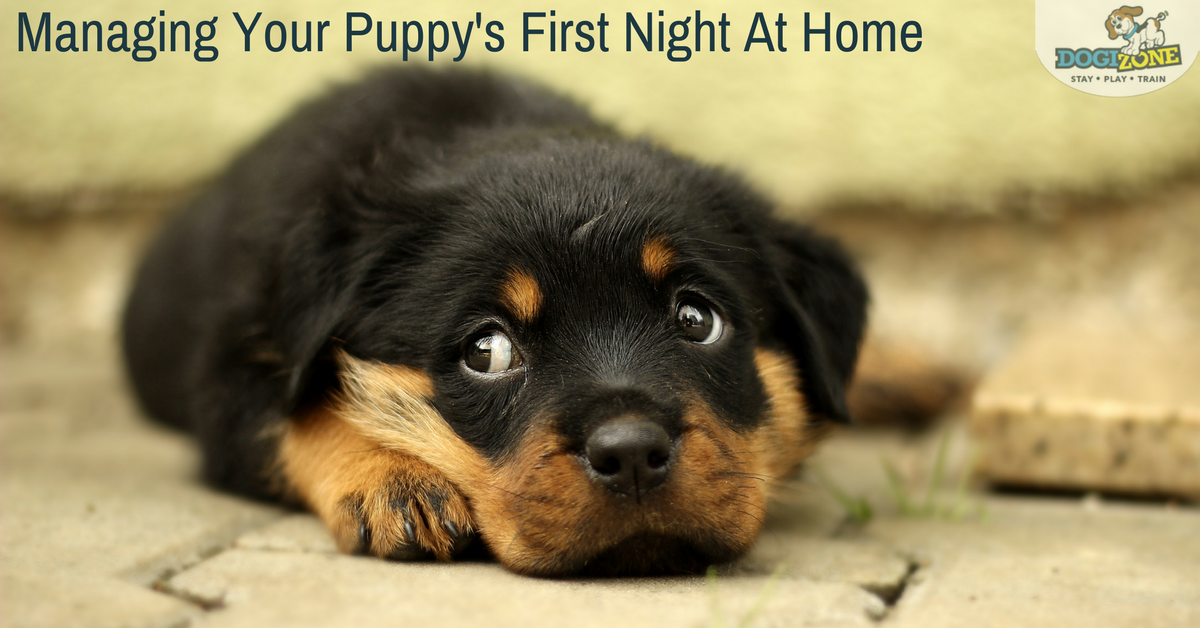Managing Your Puppy’s First Night At Home
Tips for Making Puppy’s First Night Less Stressful

Your puppy’s first night in a new place with new people and surroundings is always the most challenging for a puppy. This is particularly true if the puppy has been kept with the mother and the littermates up until the time when you finally came to come and bring him to his or her new forever home.
This is a challenging transition for the puppy as he or she doesn’t understand what is happening, just that they are all alone and away from what is familiar. The good news is that this anxiety in being away from the familiar quickly goes away as your home and your family becomes part of the puppy‘s new reality. Puppies are very resilient and, with just a bit of preparation, you can help the puppy to adjust to being away from his dog family with relative ease.
It is important to understand that the puppy will cry, whine and bark for the first few days to a couple of weeks. This is natural as it is the way the puppy would communicate distress and anxiety to the mother dog. During this time, it is essential not to punish the puppy for what is a part of natural behavior. Punishing the puppy by yelling, isolating the puppy or other forms of punishment will just add to the anxiety, confusion and fear, which can impact your relationship with the puppy both now as well as in the future.
Have a Place for the Puppy
Remember, puppies are not housetrained. Even if you plan to allow the puppy to sleep on your bed when he or she is housetrained, this is not a good idea for a very young puppy.
Instead, consider making a sleeping area for the puppy near the bed. This allows the puppy to hear, smell and see you and lets the puppy know he or she is not alone. Ideally, have a crate set up that includes a soft blanket or cushioned puppy bed as well as a few puppy-friendly chew toys. A plush puppy-safe toy is a great idea, particularly if you tie it with an old t-shirt you have worn but not washed. Alternatively, some breeders will encourage puppy owners to bring a plush toy to the kennel and this is kept with the littermates for a day or two, then goes home with you to help your puppy to sleep at night.
Try to remember to put the puppy in the crate two or three times during the day and just stay close, letting the puppy explore the area. If you do this right after a meal and a trip outside to go to the bathroom, the puppy will often go to sleep, which helps him or her to see this as a safe space.
At night, take the puppy outside and make sure he or she goes to the bathroom. Puppies may have to pee several times in one outing, particularly if they get distracted. Then, bring the puppy in and place it in the crate. The puppy may whine and cry for a few minutes, but don’t respond immediately as this will reinforce the behavior. In about 30 minutes the puppy should fall asleep.
Bathroom Breaks
Not all puppies will go through the night without the need to go to the bathroom. By 8 to 10 weeks, the puppy will know not to go to the bathroom in the “den” and will whine or cry to get out of the crate.
If you are sleeping next to the puppy in the bed, you will hear this noise. It is a signal that the puppy needs to go outside. Take the puppy to the designated area and make she he or she goes to the bathroom. Then, provide praise but don’t engage in play as you don’t want the puppy to think the middle of the night is time for fun and games.
Take the puppy back to the crate and make sure everything is clean and dry. Wish your puppy good night again and be ready to repeat this when he or she wakes up in the morning.

